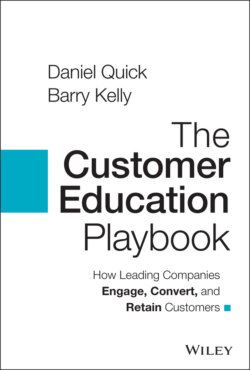Читать книгу The Customer Education Playbook - Daniel Quick - Страница 14
Knowledge Base
ОглавлениеAlso known as a help center, the knowledge base is often the first education program to come online in the lifecycle of the business. It's essentially a collection of articles that helps customers troubleshoot and find answers to their questions. Think of it like a digital instructional manual: great for self-serve and usually easy to search and filter. It is a customer education tool rather than customer education in and of itself.
Your knowledge base is a foundational program for your customer education portfolio, but it's not usually where deep learning takes place. Instead, it's more about information and knowledge transfer, and it's particularly helpful for customers who are just getting started, or who need a little help figuring out how to use a specific feature.
How to Build and Staff Your Knowledge Base You'll likely want to explore implementing a content management system (CMS) to manage your knowledge base. Some people may choose to use a learning management system (LMS), which can help with templates for support articles, but this isn't essential. Some help centers use a GitHub repository to publish content on the website. However, if your product is complex, this can be difficult to update and maintain, and you can end up having issues with version control and management across teams or stakeholders.
In terms of staffing, start with a technical writer – preferably one who has a dash of marketing under their belt. This is because your articles need to be both digestible and concise, but also weave in the value proposition and industry best practices. If you can achieve this, then you're not only deflecting support tickets, you're also starting to explain to your customers and prospects what they can gain from using your product.
One last tip: Don't put your knowledge base behind a sign-in wall for your customers only. I'm often amazed at how often help center content is read by prospects and even people who haven't ever heard of your brand, but who have been channeled to some content during a random Google search. This is a great way to get EQLs and promote brand awareness.
